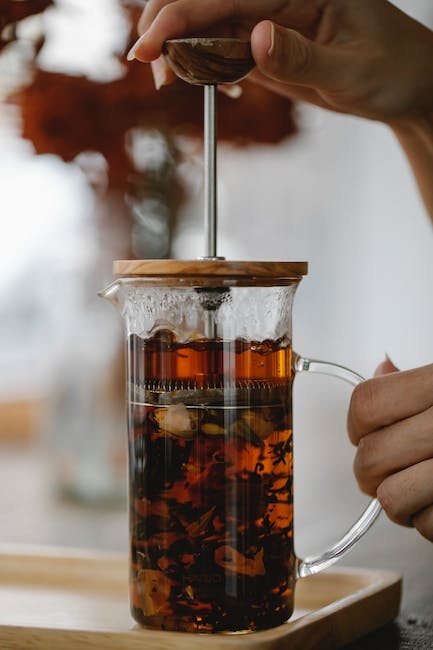Discovering the Rich and Spicy World of Chai Tea
Have you ever tasted a cup of chai tea and been transported to another world? This exquisite beverage has a fascinating history and a unique flavor profile that has captured the hearts of tea lovers worldwide. In this blog post, we will delve into the origins of chai tea, its health benefits, and the different variations that exist.
The Origins of Chai Tea
Chai tea, also known as masala chai, is a traditional Indian beverage that has been enjoyed for centuries. It was originally made by brewing a mixture of black tea, spices (such as cinnamon, cardamom, ginger, and cloves), milk, and sweetener (such as honey or sugar).
Chai tea was created as a way to make tea more palatable for the Indian population, who found the taste of black tea too bitter. The addition of spices and milk helped to soften the strong flavor of the tea and make it more enjoyable to drink.
The Popularity of Chai Tea
Chai tea has gained popularity worldwide, especially in the Western countries, and is often served in coffee shops and tea houses. Its unique and complex flavor profile combines the richness of tea with the warmth and spiciness of the added spices, making it a favorite among tea lovers.
One of the reasons for its popularity is its versatility. Chai tea can be served hot or cold, and it can be customized to suit different tastes. Some people prefer it with more milk, while others prefer it with more spices.
The Health Benefits of Chai Tea
In addition to its delicious flavor, chai tea is also known for its potential health benefits. The spices used in chai tea have been shown to aid digestion, boost immunity, and reduce inflammation.
Cinnamon, for example, has been found to lower blood sugar levels and improve heart health. Cardamom has been shown to have antimicrobial properties and can help to fight infections. Ginger has been found to reduce nausea and improve digestion, while cloves have been shown to have antioxidant properties.
The Different Variations of Chai Tea
There are many variations of chai tea, each with its own unique blend of spices and preparation methods. Some popular variations include:
| Type of Chai Tea | Ingredients |
|---|---|
| Green Tea Chai | Green tea, spices, milk, sweetener |
| Rooibos Chai | Rooibos tea, spices, milk, sweetener |
| Caffeine-Free Chai | Herbal tea, spices, milk, sweetener |
Green tea chai is a lighter and more delicate version of chai tea, while rooibos chai is a caffeine-free alternative that is perfect for those who are sensitive to caffeine. Caffeine-free chai is made with herbal tea instead of black tea, making it a great option for those who want to avoid caffeine altogether.
In Conclusion
Chai tea is a wonderful beverage that has a rich history, unique flavor profile, and potential health benefits. Whether you prefer traditional chai tea or one of the many variations that exist, there is no denying the deliciousness of this beloved beverage. So why not try a cup of chai tea today and experience the warmth and spiciness that has captured the hearts of tea lovers worldwide?
Discover the Health Benefits of Chai Tea: The Traditional Ayurvedic Remedy
Are you a tea lover? If you enjoy a warm cup of tea, you might want to try Chai tea. Chai tea has been used for centuries in Ayurvedic medicine as a natural remedy for various health conditions. This delicious beverage is made with several spices, including ginger, cinnamon, cardamom, and cloves, which provide a range of health benefits. In this blog post, we will explore the health benefits of Chai tea and how it can improve your overall well-being.
Chai Tea and Its Health Benefits
Chai tea is a blend of spices that can provide numerous health benefits. Here are some of the benefits of drinking Chai tea:
1. Antioxidant and Anti-Inflammatory Properties
Chai tea contains several spices that are rich in antioxidants, such as ginger, cinnamon, and cloves. Antioxidants can help to neutralize free radicals in the body, which can cause damage to cells and lead to chronic diseases. Additionally, chai tea’s anti-inflammatory properties can help to reduce inflammation in the body and prevent chronic diseases.
2. Lower Blood Sugar Levels
Chai tea may help to lower blood sugar levels. A study conducted on a group of people with type 2 diabetes showed that drinking chai tea for 12 weeks helped to reduce their blood sugar levels significantly. The study suggests that the spices in chai tea may help to improve insulin sensitivity and glucose metabolism.
3. Improve Digestion
The spices in chai tea can help to improve digestion. Ginger, in particular, has been shown to have anti-nausea and anti-inflammatory properties that can help to relieve digestive issues. Additionally, cinnamon can help to reduce bloating and gas.
4. Boost Immunity
Chai tea can help to boost immunity. The spices in chai tea, such as ginger and cardamom, have antibacterial and antiviral properties that can help to protect the body against infections. Additionally, the antioxidants in chai tea can help to strengthen the immune system.
5. Reduce the Risk of Heart Disease
Chai tea may help to reduce the risk of heart disease. The spices in chai tea, such as cinnamon and cloves, have been shown to have anti-inflammatory properties that can help to reduce the risk of heart disease. Additionally, the antioxidants in chai tea can help to improve blood vessel function and reduce cholesterol levels.
Chai Tea and Its Nutritional Value
Chai tea is also a good source of vitamins and minerals that can provide additional health benefits. Here are some of the nutrients found in chai tea:
| Nutrient | Amount per Serving |
|---|---|
| Vitamin C | 6 mg |
| Magnesium | 2 mg |
| Potassium | 26 mg |
Chai Tea and Caffeine
Since chai tea is typically made with black tea, which contains caffeine, people who want to avoid caffeine can opt for decaf chai tea or herbal chai tea blends that do not contain any tea leaves. Additionally, some chai tea blends contain green tea, which contains less caffeine than black tea.
Conclusion
Chai tea is a delicious and nutritious beverage that can provide numerous health benefits. The spices in chai tea have antioxidant, anti-inflammatory, and anti-cancer properties that can help to improve overall well-being. Additionally, chai tea is a good source of vitamins and minerals that can provide additional health benefits. So, next time you crave a warm cup of tea, give Chai tea a try and enjoy its numerous health benefits.
Discovering the Best Caffeine-Free Chai Tea Blends
Chai tea is a flavorful and aromatic drink that has become increasingly popular in recent years. It’s a blend of black tea, spices, and milk that can be served hot or cold. However, some individuals avoid traditional chai tea because of its caffeine content. Fortunately, there are several brands and blends of caffeine-free chai tea that provide the same great taste without the caffeine buzz. Here are some of the best caffeine-free chai tea blends to try:

1. Rooibos Chai
Rooibos chai is a South African herbal tea that is made from the leaves of the rooibos plant. This tea is naturally caffeine-free and is often blended with traditional chai spices such as cinnamon, ginger, cardamom, and cloves. Rooibos chai has a smooth and slightly sweet taste that is perfect for those who want to enjoy chai tea without the caffeine.
2. Honeybush Chai
Honeybush chai is another South African herbal tea that is similar to rooibos but has a slightly sweeter and nuttier taste. This tea is often blended with chai spices and is caffeine-free. Honeybush chai is a great alternative for those who want a little more sweetness in their chai tea.
3. Decaffeinated Chai
Many tea companies offer decaffeinated chai blends that use a decaffeination process to remove most of the caffeine from the tea leaves. These blends usually still contain some caffeine, but in much lower amounts than traditional chai. Decaffeinated chai is perfect for those who want to enjoy chai tea without the caffeine buzz.
4. Herbal Chai
Herbal chai blends use a variety of caffeine-free herbs and spices to mimic the flavor of traditional chai. These blends may include ingredients like fennel, peppermint, and licorice root. Herbal chai is a great option for those who are looking for a completely caffeine-free alternative to traditional chai tea.
When choosing a caffeine-free chai tea, it’s important to read the label carefully to ensure that it doesn’t contain any hidden sources of caffeine, such as black tea or green tea leaves. By choosing a caffeine-free chai tea blend, you can enjoy the delicious taste of chai tea without worrying about the caffeine content.
| Caffeine-Free Chai Tea Blends | Benefits |
|---|---|
| Rooibos Chai | Naturally caffeine-free |
| Honeybush Chai | Slightly sweeter taste |
| Decaffeinated Chai | Lower caffeine content |
| Herbal Chai | Completely caffeine-free |
Overall, there are several great caffeine-free chai tea blends to try. Whether you prefer the smooth taste of rooibos chai or the slightly sweeter taste of honeybush chai, there is a blend out there for everyone. So, why not try a caffeine-free chai tea today and enjoy all the delicious flavors and aromas of traditional chai without the caffeine buzz?
How to Make the Perfect Cup of Chai Tea
Chai tea is a delicious and flavorful drink that is perfect for any time of day. It is a staple in many cultures, and its popularity has spread around the world. Making the perfect cup of chai tea is an art form, and it all starts with quality ingredients. Here are some tips on how to make the perfect cup of chai tea:
Start with Quality Ingredients
The first step in making the perfect cup of chai tea is to start with fresh spices like cinnamon sticks, cardamom pods, cloves, and ginger. Opt for loose-leaf tea instead of tea bags for a more flavorful brew. The quality of your ingredients will make a big difference in the taste of your chai tea.
Heat the Water
Next, bring water to a boil in a kettle or pot. For a stronger tea, use a 1:1 ratio of water to milk. For a lighter tea, use a 2:1 ratio of water to milk. The heat of the water is important in brewing the perfect cup of chai tea.
Add the Spices
Once the water is boiling, add the spices and let them simmer for 5-10 minutes. This will infuse the water with flavor. The longer you let the spices simmer, the more flavor they will impart to the tea.
Add the Tea
After the spices have simmered, add the loose-leaf tea and let it steep for 3-5 minutes. Be sure not to over-brew the tea, as this can result in a bitter taste. The tea will add a rich flavor to the chai tea.
Strain and Serve
Use a fine mesh strainer or cheesecloth to strain out the spices and tea leaves. Serve the chai tea hot, with honey or sweetener of choice, and a dash of cinnamon on top if desired. Straining the tea will ensure that it is smooth and free of any particles.
Optional Additions
For a creamier texture, add a splash of coconut milk or almond milk. For a sweeter taste, add a few drops of vanilla extract or maple syrup. These additions will give your chai tea a unique flavor and texture.
Making the perfect cup of chai tea takes time and attention to detail, but the end result is well worth the effort. Use these tips to make a delicious and flavorful cup of chai tea that you will love.


Leave a Reply